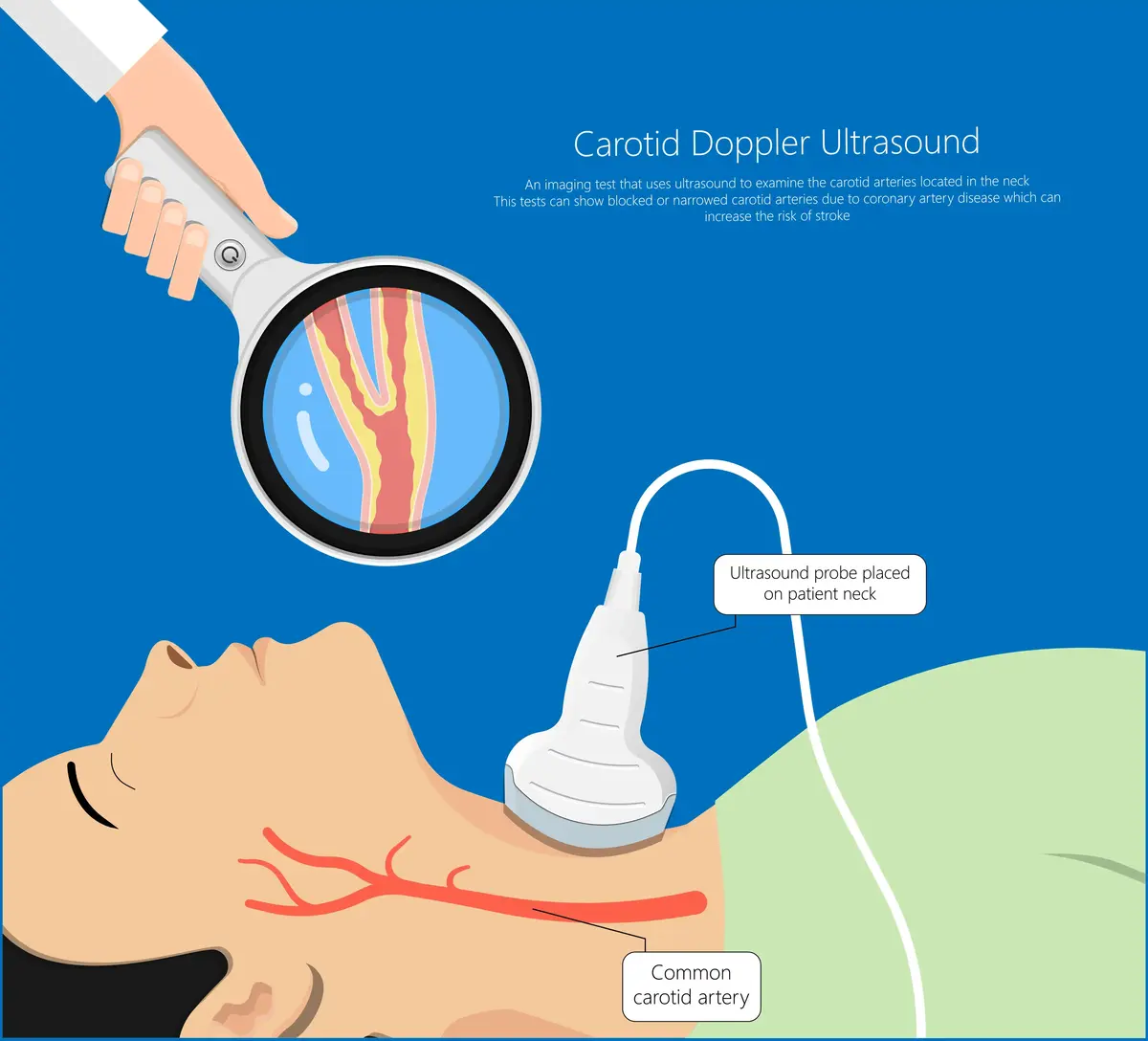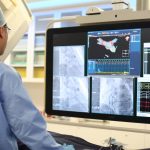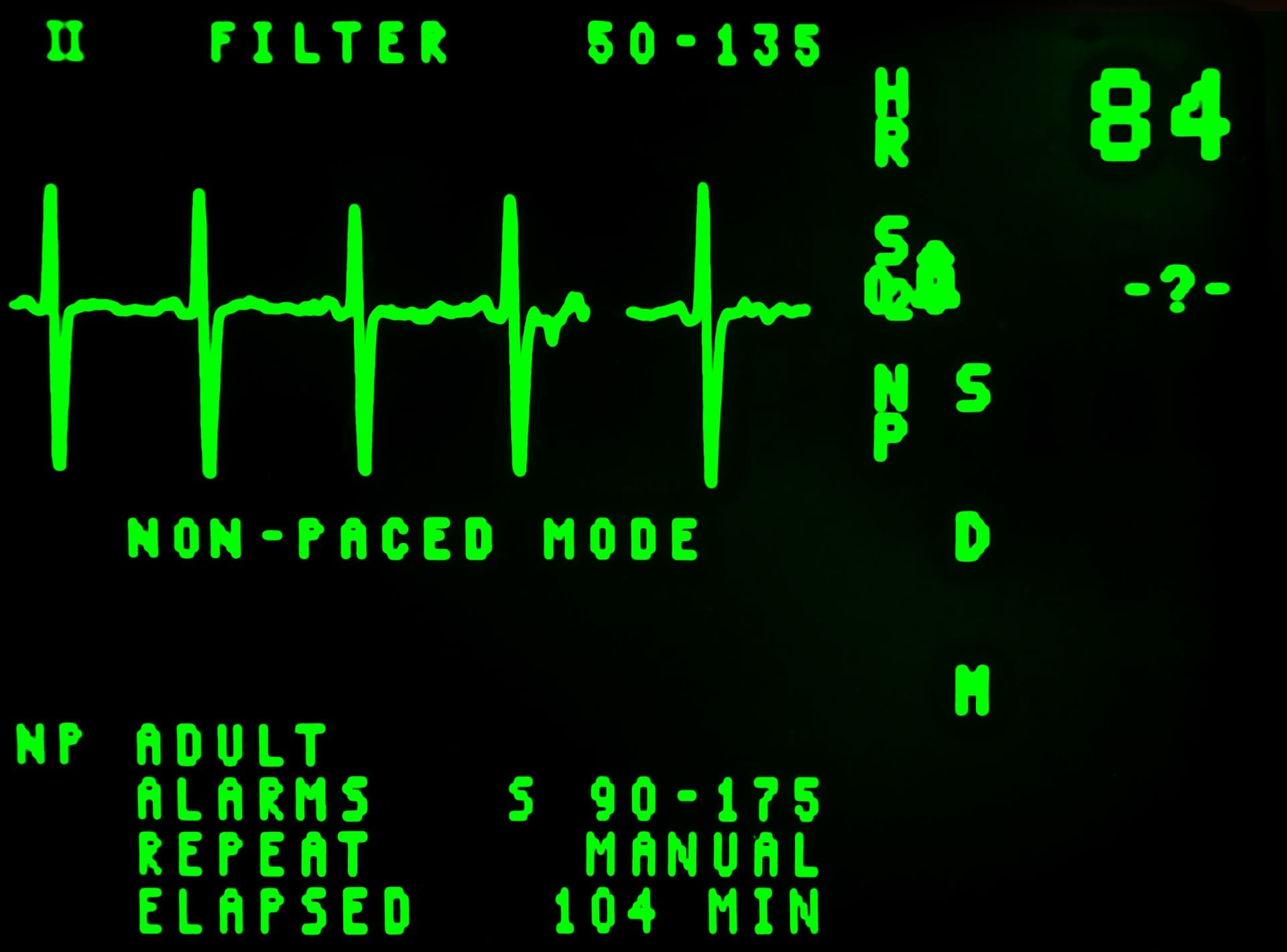Carotid Ultrasound: A Comprehensive Guide to Stroke Prevention and Heart Health


Introduction
Carotid ultrasound is a non-invasive, safe, and highly informative imaging technique used to evaluate the structure and function of the carotid arteries. These major blood vessels supply blood to the brain and are critical to brain function. Any narrowing or blockage can increase the risk of stroke. As part of comprehensive cardiovascular care, carotid ultrasound is pivotal in the early detection and prevention of serious complications.
At The Harley Street Heart & Vascular Centre, we use advanced carotid ultrasound to assess our patients' risk for cardiovascular and/or cerebrovascular disease and guide treatment decisions.
What is a Carotid Ultrasound?
A carotid ultrasound—also known as a carotid duplex scan—is a medical imaging test that uses high-frequency sound waves (ultrasound) to produce real-time images of the carotid arteries located on each side of your neck.
The test provides two types of information:
- B-mode imaging: Visualises the structure of the arteries and identifies plaque buildup.
- Doppler ultrasound: Measures the speed and direction of blood flow to detect narrowing (stenosis) or blockages.
Unlike CT scans or angiography, carotid ultrasound does not involve radiation or contrast dye, making it a preferred tool for routine vascular screening.
Diagnostic Detail: The Cleveland Clinic explains that Doppler ultrasound, a component of carotid ultrasound, measures blood flow by detecting changes in pitch as sound waves bounce off red blood cells. This helps identify narrowed arteries.
Why is a Carotid Ultrasound Performed?
Carotid ultrasound is typically performed to evaluate a person's vascular health and risk of stroke or to investigate symptoms that may suggest reduced blood flow to the brain.
Common Indications:
- Transient ischemic attack (TIA) or mini-stroke symptoms
- Stroke evaluation and follow-up
- Carotid bruit heard during physical examination
- Dizziness, vision disturbances, or sudden weakness
- Monitoring known carotid artery disease
- Preoperative assessment before heart or vascular surgery
- Screening for vascular disease
Understanding the Carotid Arteries and Their Importance
The carotid arteries are two large blood vessels—one on each side of the neck—that deliver oxygen-rich blood from the heart to the brain.
These arteries can become narrowed or blocked due to atherosclerosis, a condition in which fatty deposits (plaques) accumulate on the arterial walls. If left untreated, this can lead to:
- Stroke: Caused by reduced or blocked blood flow to the brain
- Transient ischemic attacks (TIAs): Temporary loss of blood flow with stroke-like symptoms
- Carotid artery dissection: A tear in the artery wall that can reduce or block blood flow
Identifying issues in these arteries early through carotid ultrasound can significantly reduce the risk of serious cardiovascular and neurological events.


How Carotid Ultrasound Works
Carotid ultrasound is based on the principles of sound wave reflection. A small handheld device called a transducer emits sound waves and captures the echoes as they bounce off blood cells and tissue structures.
These echoes are converted into real-time images and colour flow maps that visualise blood movement and identify abnormalities in:
- Vessel diameter
- Blood flow velocity
- Plaque composition (e.g., soft vs. calcified)
- Arterial wall thickening (intima-media thickness)
The use of colour Doppler and spectral Doppler enhances the test’s ability to detect areas of turbulence or narrowing that may impair cerebral perfusion.
Who Should Get a Carotid Ultrasound?
Not everyone requires carotid imaging, but it is particularly beneficial for individuals at risk of cardiovascular disease or those who have experienced concerning symptoms.
We offer comprehensive vascular screening through our heart screening program, which includes carotid ultrasound as part of an evidence-based risk assessment.
Benefits of Carotid Ultrasound
Carotid ultrasound offers several advantages that make it a valuable diagnostic and preventive tool.
Key Benefits:
- Non-invasive and painless
- No exposure to radiation
- No need for contrast agents
- Highly accurate in detecting carotid artery stenosis
- Cost-effective compared to other imaging methods
- Quick results and immediate feedback
Because it is easy to perform and interpret, carotid ultrasound is commonly used for initial evaluation and follow-up monitoring.
What to Expect During the Procedure
Knowing what to expect during a carotid ultrasound can help alleviate anxiety and ensure you’re well-prepared.
Before the Scan:
- No fasting or special preparation is typically required
- Wear a comfortable shirt with a loose collar
- Remove necklaces or earrings that may interfere with the probe
During the Scan:
- You will lie on your back with your neck slightly extended
- A water-based gel will be applied to your neck
- The transducer will be gently moved over your skin to capture images
- The scan takes about 15 to 30 minutes
After the Scan:
- You can resume normal activities immediately
- Results are reviewed by a vascular specialist or radiologist
At The Harley Street Heart & Vascular Centre, we ensure a seamless and comfortable experience with expert interpretation by our heart specialists.
Carotid Ultrasound vs. Other Imaging Modalities
In some cases, other imaging tests may be used alongside or in place of carotid ultrasound.
Carotid Ultrasound vs. CT Angiography (CTA):
- CTA provides detailed 3D images but involves radiation and contrast dye
- Ultrasound is safer and better for initial screening
Carotid Ultrasound vs. MRI Angiography (MRA):
- MRA is excellent for surgical planning and deep vessel evaluation
- Ultrasound is more accessible and cost-effective
Limitations of Carotid Ultrasound
While carotid ultrasound is highly useful, it does have some limitations:
- Operator-dependent accuracy
- Limited view of deeper or intracranial arteries
- May be less effective in patients with thick necks or extensive calcification
In cases requiring detailed anatomical mapping, your cardiologist may recommend a CTA or MRA for complementary assessment.
Integrating Carotid Ultrasound into Preventive Care
Carotid ultrasound is a cornerstone of preventive cardiology. Early detection of arterial disease allows for timely lifestyle changes, medication adjustments, and risk factor control.
Lifestyle Modifications Post-Scan:
- Adopt a heart-healthy diet (e.g., DASH or Mediterranean diet)
- Engage in regular exercise
- Quit smoking
- Manage diabetes, hypertension, and cholesterol
Medical Interventions:
- Statins to reduce cholesterol
- Antiplatelet medications to prevent clots
- Surgery or stenting for severe blockages
Preventive Strategy: The American Heart Association recommends sitting less and moving more. Try to be physically active every day. At least 150 minutes per week of moderate-intensity physical activity can help lower blood pressure and cholesterol.
Cost of Carotid Ultrasound in Singapore
The cost of a carotid ultrasound in Singapore typically ranges between SGD 300 and SGD 1000, depending on whether the test is bundled with other assessments.
At The Harley Street Heart & Vascular Centre, we offer transparent pricing and assist with insurance claims. Contact us for more details or to schedule an appointment.
Frequently Asked Questions (FAQs)
Is Carotid Ultrasound Painful?
No. It is a painless, non-invasive test that involves no injections or needles.
How Often Should I Get a Carotid Ultrasound?
For individuals with risk factors, it may be done every 1–2 years. Your doctor will advise based on your profile.
Can a Carotid Ultrasound Detect All Causes of Stroke?
No. While it detects large-vessel disease, strokes can also be caused by cardiac emboli or small-vessel disease.
Is Fasting Required Before a Carotid Ultrasound Scan?
No. There is no need to fast unless your scan is bundled with blood tests.
Can Carotid Ultrasound Be Performed During Pregnancy?
Yes. It is completely safe during pregnancy.
Conclusion
Carotid ultrasound is a powerful, non-invasive diagnostic tool that plays a critical role in stroke prevention and cardiovascular disease management. It can detect narrowing and blockages in the carotid arteries early, providing valuable insights that can save lives.
At our heart clinic, we offer state-of-the-art carotid ultrasound services delivered by experienced doctors. Whether you have risk factors, symptoms, or a family history of stroke or heart disease, our team is here to support your journey toward better cardiovascular health.
Book your appointment today and take the first step in protecting your heart.


